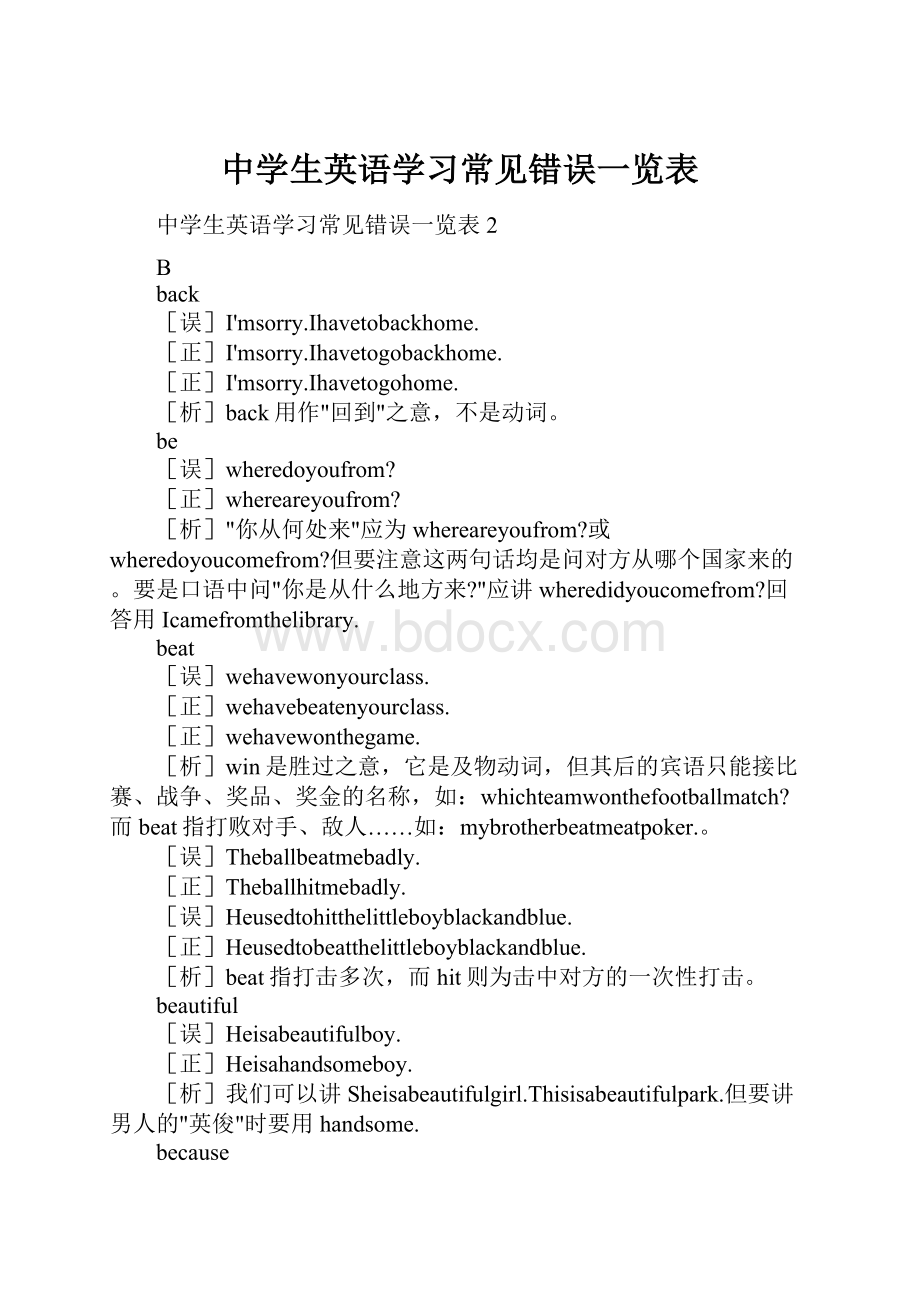 中学生英语学习常见错误一览表.docx
中学生英语学习常见错误一览表.docx
- 文档编号:9692462
- 上传时间:2023-02-05
- 格式:DOCX
- 页数:18
- 大小:27.58KB
中学生英语学习常见错误一览表.docx
《中学生英语学习常见错误一览表.docx》由会员分享,可在线阅读,更多相关《中学生英语学习常见错误一览表.docx(18页珍藏版)》请在冰豆网上搜索。

中学生英语学习常见错误一览表
中学生英语学习常见错误一览表2
B
back
[误]I'msorry.Ihavetobackhome.
[正]I'msorry.Ihavetogobackhome.
[正]I'msorry.Ihavetogohome.
[析]back用作"回到"之意,不是动词。
be
[误]wheredoyoufrom?
[正]whereareyoufrom?
[析]"你从何处来"应为whereareyoufrom?
或wheredoyoucomefrom?
但要注意这两句话均是问对方从哪个国家来的。
要是口语中问"你是从什么地方来?
"应讲wheredidyoucomefrom?
回答用Icamefromthelibrary.
beat
[误]wehavewonyourclass.
[正]wehavebeatenyourclass.
[正]wehavewonthegame.
[析]win是胜过之意,它是及物动词,但其后的宾语只能接比赛、战争、奖品、奖金的名称,如:
whichteamwonthefootballmatch?
而beat指打败对手、敌人……如:
mybrotherbeatmeatpoker.。
[误]Theballbeatmebadly.
[正]Theballhitmebadly.
[误]Heusedtohitthelittleboyblackandblue.
[正]Heusedtobeatthelittleboyblackandblue.
[析]beat指打击多次,而hit则为击中对方的一次性打击。
beautiful
[误]Heisabeautifulboy.
[正]Heisahandsomeboy.
[析]我们可以讲Sheisabeautifulgirl.Thisisabeautifulpark.但要讲男人的"英俊"时要用handsome.
because
[误]ThereasonwhyIwaslateisbecauseIwasill.
[正]ThereasonwhyIwaslateisthatIwasill.
[误]BecauseitwasSunday,sotheparkwascrowded.
[正]BecauseitwasSundaytheparkwascrowded.
[析]这种错误是因为中文的习惯与英语的表述法不同,中文常讲我来晚了的原因是因为我病了,而英文中的第二个因为要用that代替。
又因中文常讲因为……所以……,而英文中用了因为就不能再用所以了,同样用了"所以"也就不要再用"因为"一词。
例如:
Becausewestudyhard,wepassedtheexameasily.或者:
westudyhardsowepassedtheexameasily.
becausebecauseof
because后要接从句,例如:
welikephysicsbecausewecanlearnalotofnewideas.而becauseof后要接名词作介词宾语,如:
Heisnotatschoolbecauseoftheillness.
before
[误]wehavetwohourstokillbeforewewillgohome.
[正]wehavetwohourstokillbeforewegohome.
[析]killtime意为"消磨时光"。
英语状语从句中要用一般现在时表示将来的动作。
如:
Ifitrainswewillnotgotothepark.
[误]Ididthisworktwodaysbefore.
[正]Ididthisworktwodaysago.
[析]用ago组成的时间状语其主句中的谓语动词要用过去时,而before引起的时间状语其主句中的谓语动词多用完成时,如:
Ihasdonethisworkafewdaysbefore.
beforelonglongbefore
beforelong是"不久"之意,例如:
IshallgotoAmericabeforelong.而longbefore则是"很久很久"之意,如:
weknewthisteacherlongbeforewesawhim.
begin
[误]Themeetingwillbeginfrommonday.
[正]Themeetingwillbeginonmonday.
[误]Thefilmhasbegunfortenminutes.
[正]Thefilmhasbeenonfortenminutes.
[析]begin是瞬间动词,所以它的完成时态不能接表示一段时间的状语,如:
Thefilmhasbegun.这句话是对的,即"电影已经开始"。
但要讲已经开始10分钟了则要用hasbeenon即"上演了10分钟"。
beginstart
begin与start两词后面加不定式或动名词都可以,且意思并无区别,但在表达习惯时接动名词的用法较多,如:
HowoldwernyouwhenyoufirststartedlearningEnglish?
但这两个词的进行时态中则多用不定式,如:
Iwasbeginningtogethungry.但如果句子的主语是物而不是人,则多用不定式,如:
Theicebegantomelt.Itstartedtogetdarkbeforewegottoschool.当动词是表达某种心理状态时,要用不定式,如:
Thestudentbegantounderstandhismistakes.
[误]Theystudyhardintheclassfromthebeginningtotheend.
[正]Theystudyhardintheclassfrombeginningtoend.
[析]frombeginningtoend是习惯用法,即自始至终,不要加冠词,但如单独使用则要加冠词,例如:
Atthebeginning,theteachergaveusanexam.
behind
[误]Hemissedtheclassbecausehewasbehindthetime.
[正]Hemissedtheclassbecausehewasbehindtime.
[析]behindtime一短语意为"晚了",而behindthetimes意为"落后于时代"。
behind是介词同时又是副词,如comeoutfrombehindthedoor.He'salongwaybehind.Hefellbehindwithhisclassmates.
below
[误]what'sthatbelowthechair.
[正]what'sthatunderthechair.
[析]under意为"正下方",而below意为"比……低",或指"在下游"。
如:
Thereisafallbelowtheriver.其反义词为over,如:
Thereisabigplaneflyingoverthecity.但在"下面的例子"一表达语中则要用theexamplebelow,而不要用under.
beside
[误]Thestudentsstoodbesidestheteacher.
[正]Thestudentsstoodbesidetheteacher.
[误]IstudyEnglishbesidechinese.
[正]IstudyEnglishbesideschinese.
[析]beside意为"在……旁边",而besides是"除……以外"。
besidebynear
beside意为"在……旁",如:
Thereisatalltreebesidetheriver.by多指"倚、靠"、"沿着"之意,如:
Sheisstandingbythewindow.near多用来表示两地间距离不远,如:
Thereisapostofficenearourschool.
better
[误]youhadbettertodoitathome.
[正]youhadbetterdoitathome.
[误]youhadn'tbetterwakemeupatsix.
[正]youhadbetternotwakemeupatsix.
[析]hadbetter在肯定句中为"应该作某事",其后加不带to的不定式,而在否定句中应用hadbetter+not+动词原形。
在简答语中had常省略为'd,如:
you'dbetternot.又如:
Let'sgofirst.No,we'dbetternot.
between
[误]Amongthetwotreesthereisaspaceofthefeet.
[正]Betweenthetwotreesthereisaspaceofthefeet.
[析]两者之间多用between,三者或三者以上之间则用among.
[误]youmustchoosebetweenthiscluborthatclub.
[正]youmustchoosebetweenthisclubandthatclub.
[析]在两个之间作出选择要用between…and…,而不能用between…or….
big
[误]Therewasabigrainlastnight.
[正]Therewasaheavyrainlastnight.
[析]大雨在英语中只能用aheavyrain而不要用abigrain.
bit
[误]Heisabitfool.
[正]Heisabitofafool.
[析]abit可以作程度副词,与alittle相同,但它用于名词前应用abitof,而用于形容词前则应用abit,如:
I'mabittired,而其简答的否定句应为Notabit,又如:
-DoyoumindifIopenthedoor?
-Notabit.
black
[误]Thechildrenbecameblackafterswimminginthesea.
[正]Thechildrenbecamesunburnedafterswimminginthesea.
[析]因太阳照晒而皮肤变黑,不应用black而应用sunburned,suncolour或dark.
[误]Thegirlhasblackeyesandblack
hair.
[正]Thegirlhasdarkeyesandblackhair.
[析]英语中blackeyes的意思是被打得发青的眼睛。
[误]TheEuropeanslikeredtea.
[正]TheEuropeanslikeblacktea.
[析]红茶在英文中应为blacktea.这种惯用法还有:
blackandblue;blackandwhite。
goblack意为"在失去知觉时眼前一片黑暗";lookblack意为"情况不妙,前景暗淡"。
如:
Afterthefighthewasblackandblue.onTV,Ilikecolourforsomethingandblackandwhiteforothers.
body
[误]Goingtobedearlierandgettingupearlierisgoodforyourbody.
[正]Goingtobedearlierandgettingupearlierisgoodforyourhealth.
[析]中文常讲对你身体有利,而英文中则讲对你健康有利。
borrow
[误]mayIlendsomebooksfromthelibrary?
[正]mayIborrowsomebooksfromthelibrary?
[误]HowlongcanIborrowit?
[正]HowlongcanIkeepit?
[析]英语中有三个词都可译为"借",但意义各不相同如:
"借入"是borrow,其常用句型结构是borrowsomethingfromsomebody,这是个瞬间性动词,不可与表示延续的时间状语连用。
例如:
Thestudentswanttoborrowsomebooksfromthelibrary."借出"用lend,即借给别人东西。
其常用句型是lendsomebodysomething,或lendsomethingtosomebody.例如:
couldyoulendusyourdictionary?
或couldyoulendyourdictionarytous?
它也是瞬间性动词,也不能与延续的时间状语连用。
keep则是延续性动词,可以和表示长时间段的时间状语连用,也可与howlong等疑问词连用,如:
youcankeepitforthreedays.
born
[误]IborninShanghai.
[正]IwasborninShanghai.
[误]HewasbornfromGreekparents.
[正]HewasbornofGreekparents.
[析]"出身于……样的家庭"不要作from而要用of,例如:
Hewasbornofapoorfamily.
both
[误]Theybotharestudents.
[正]Theyarebothstudents.
[误]Theyrefusebothtoanswerthisquestion.
[正]Theybothrefusetoanswerthisquestion.
[析]both作同位语时,一般要用在be动词之后实意动词之前。
[误]Iknowhisbothparents.
[正]Iknowbothhisparents.
[误]Thebothbrotherswerestudents.
[正]Boththebrotherswerestudents.
[正]Bothbrotherswerestudents.
[析]当both与形容词性物主代词my,his,her等以及定冠词the连用时,都应将这些词置于both之后。
另外,在与定冠词连用时the可以省略。
[误]Bothofmyparentsarenotathome.
[正]Neitherofmyparentsareathome.
[误]Bothofyouranswersarenotright.
[正]Neitherofyouranswersisright.
[正]Bothyouranswersarewrong.
[析]both不能用于否定句中作主语。
表示"两者都不"时要用neither;但作宾语时both与either则都对,但要注意句意有所不同。
例如:
Icannotgivebothofthebookstoyou.而Icannotgiveeitherofthebookstoyou.
bring
[误]PleasebringthisdictionarytomrBrown.
[正]PleasetakethisdictionarytomrBrown.
[误]Nexttime,pleasetakeyourlittlesisterhere.
[正]Nexttime,pleasebringyourlittlesisterhere.
[析]英语中bring是"带来",而take是"带走"。
还有一个词fetch,表示"到某处去把某物取、接回来"。
如:
Pleasefetchthedoctoratonce.
business
[误]myfatherwenttoShanghaiforbusiness.
[正]myfatherwenttoShanghaionbusiness.
[析]onbusiness出差
busy
[误]Thestudentswereverybusytopreparefortheexam.
[正]Thestudentswereverybusypreparingfortheexam.
[析]bebusydoingsomething为"忙于作某事"
[误]Thestudentswerebusyfortheexam.
[正]Thestudentswerebusywiththeexam.
[析]busy直接接名词时应用with.
but
[误]Hecouldn'thelpbutrealizingthathewaswrong.
[正]Hecouldn'thelpbutrealizethathewaswrong.
[误]Shecouldn'thelptocrywhenshesawhermother.
[正]Shecouldn'thelpcryingwhenshesawhermother.
[析]couldn'thelp其后应接动名词,表示情不自禁的动作,但couldn'thelpbut后面要加动词原形即省to的不定式,所以前一句应译为"他才真正认识到他错了。
"
buy
[误]Ihaveboughtthisdictionaryforthreeyears.
[正]Ihavehadthisdictionaryforthreeyears.
[析]buy是截止性动词,它可以有完成时,如:
Ihaveboughtthisdictionary.但是不能与表示较长的时间状语连用。
如要讲我这本字典已买了3年了则要用havehad这一结构即我拥有这本字典已3年了。
by
[误]Theboyshotthecatbyagun.
[正]Theboyshotthecatwithagun.
[误]Hecametoschoolbyataxithismorning.
[正]Hecametoschoolbytaxithismorning.
[析]作为某种运输手段来讲,by与名词间不能有冠词,如:
bycar,bybike,byair等。
如有了冠词或其他修饰词,则应用别的相应的介词,如:
"我们今天早上是乘他的车来的"一句应译为:
wecamehereinhiscarthismorning.与by结合而成的词组很多,常用的有:
bytheway顺便说说;byhand手工制作;byoneself独自地;bynomeans决不。
c
call
[误]I'llcallatmrBrown.
[正]I'llcallonmrBrown.
[误]I'llcallonmrBrown'shome.
[正]I'llcallatmrBrown'shome.
[析]作"拜访"讲时,at后面接访问地点,而on后面接访问的人。
callondropinvisit
callon比较正式的为公务的访问,如:
wewerecalledonbytheoldstudents.而dropin则是比较随便的走走,顺便拜访,如:
Ifyou'refree,dropin.而visit则是更正式的外交访问或友好往来,如:
myschool'sheadmasterwillvisitAmericanextweek.
can
[误]Ablindmancannotjudgecolours.
[正]Ablindmancannotjudgecolours.
[误]Icann'tcallforyouatten.
[正]Ican'tcallforyouatten.
[析]can的否定形式应为cannot或can't.
[误]It'sonlysixo'clock.Thatmustn'tbethepostman.
[正]It'sonlysixo'clock.Thatcan'tbethepostman.
[析]must用来表示一种肯定的推断,如:
Shemusthavesomeproblems.Shekeepscrying.但在否定句中则要用can't,要表示对过去的推测则要用"must+have+过去分词"的表达法,如:
Thelightshavegoneout.Afusemusthaveblown.而对过去的否定推测则多用"can't+have+过去分词",如:
Idon'tthinkhecanhaveheardyou.callagain.
[误]wecouldnothelptolaughatonce.
[正]wecouldnothelplaughingatonce.
[正]wecouldnothelpbutlaughatonce.
[析]"couldn'thelp+动名词"表示禁不住做了某事。
但couldnothelpbut与couldnotbut后面要加不带to的不定式,意思都是不得不去做某事.如:
youcouldnotbutrespecthim.
canbeableto
can与beableto都可以用来表示能力,但can只有现在时与过去时,beableto则可用任何时态,如:
Hewillbeabletoteachthechild.但要表示经过努力而达到的一次性动作则只能用beableto,如:
Hefinallywasabletojumpover210meters.或:
Theplanewasabletoflyoverthemountain.但要注意的是这两个词都没有进行时态,而beableto后面不接不定式的被动态。
cancould
can与could都可以用在现在时的口语中,只是用could更为礼貌,语气更委婉。
如:
couldyoutellusastory?
care
[误]Idon'tcarecoffee.
[正]Idon'tcareforcoffee.
[误]Takecareforyoursteps.
[正]Takecareofyoursteps.
[析]carefor是"对某物感兴趣",而careof是"关心,要当心某事",如:
Shedidn'tcareforhim.Takecareofwhatyouaredoing.
[误]Idon'tcarewherewewillgoifitdoesn'train.
[正]Idon'tcarewherewegoifitdoesn'train.
[析]在itdoesn'tmatter,Idon'tcare,Idon'tmind,及incase引出的状语从句后面要用现在时表示将来。
如:
I'vegotafootballincasewehavetimeforagame.
change
[误]Iwanttochangemycamerawiththa
- 配套讲稿:
如PPT文件的首页显示word图标,表示该PPT已包含配套word讲稿。双击word图标可打开word文档。
- 特殊限制:
部分文档作品中含有的国旗、国徽等图片,仅作为作品整体效果示例展示,禁止商用。设计者仅对作品中独创性部分享有著作权。
- 关 键 词:
- 中学生 英语 学习 常见 错误 一览表
 冰豆网所有资源均是用户自行上传分享,仅供网友学习交流,未经上传用户书面授权,请勿作他用。
冰豆网所有资源均是用户自行上传分享,仅供网友学习交流,未经上传用户书面授权,请勿作他用。


 《城市规划基本知识》深刻复习要点.docx
《城市规划基本知识》深刻复习要点.docx
